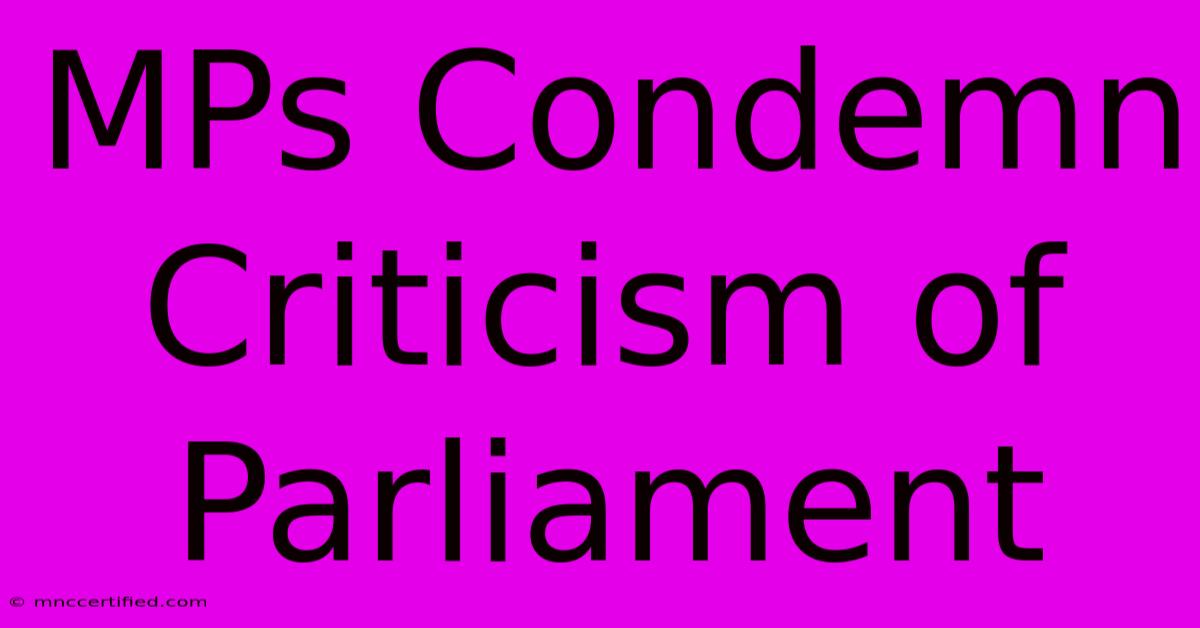MPs Condemn Criticism Of Parliament

Table of Contents
MPs Condemn Criticism of Parliament: A Growing Divide?
The recent wave of criticism directed at Parliament has sparked a fierce backlash from MPs across the political spectrum. This article delves into the specifics of the condemnation, explores the underlying causes of the public discontent, and analyzes the potential consequences of this widening rift between the public and their elected representatives.
The Source of the Backlash: What Sparked the Criticism?
The criticism leveled against Parliament isn't monolithic. It stems from a confluence of factors, including:
-
The Cost of Living Crisis: Soaring inflation and the increasing cost of essential goods have fueled public anger, with many blaming MPs for failing to adequately address the crisis. The perception of MPs being out of touch with the struggles faced by ordinary citizens is a significant driver of this discontent. Keyword: Cost of living crisis, MPs out of touch
-
Partygate Scandal: The lingering effects of the Partygate scandal continue to erode public trust. Allegations of rule-breaking within Parliament during COVID-19 lockdowns have left many feeling betrayed and disillusioned. Keyword: Partygate, Public trust, Erosion of trust
-
Lack of Transparency: Concerns about a lack of transparency and accountability within Parliament further exacerbate the situation. The public's desire for more open and honest governance is unmet, leading to frustration and cynicism. Keyword: Lack of transparency, Accountability, Open governance
-
Ineffective Legislation: Criticisms also extend to the perceived ineffectiveness of legislation passed by Parliament. Many feel that laws are not adequately addressing pressing societal issues, leading to a sense of frustration and powerlessness. Keyword: Ineffective legislation, Societal issues
MPs' Response: A Unified Front or Fractured Defenses?
In response to the mounting criticism, MPs have largely united in condemning the attacks on Parliament. Statements from across the political spectrum emphasize the importance of respecting democratic institutions and the vital role Parliament plays in representing the people. However, this unified front masks a deeper division.
The Challenges of Addressing Public Concerns:
While MPs condemn the criticism, their responses often lack substance. Many critics argue that simply condemning the criticism without addressing the underlying issues is insufficient. A genuine effort to engage with public concerns and implement meaningful reforms is crucial to rebuilding trust. Keyword: Rebuilding trust, Meaningful reforms
The Potential Consequences: A Damaged Democracy?
The widening gap between Parliament and the public poses significant risks to the democratic process. Continued distrust can lead to:
-
Reduced Voter Turnout: Apathy and disillusionment can result in lower voter turnout, weakening the democratic mandate of elected officials. Keyword: Voter turnout, Democratic mandate
-
Rise of Populism: The erosion of trust in established institutions can create fertile ground for populist movements that exploit public discontent. Keyword: Populism, Political instability
-
Increased Political Instability: A lack of public faith in the political system can lead to increased instability and difficulty in forming and maintaining effective governments. Keyword: Political instability, Government effectiveness
The Path Forward: Restoring Faith in Parliament
Rebuilding trust in Parliament requires a concerted effort from all stakeholders. This involves:
-
Increased Transparency and Accountability: Implementing measures to improve transparency and accountability within Parliament is essential. This includes greater openness in decision-making processes and stronger mechanisms for holding MPs accountable for their actions.
-
Addressing the Cost of Living Crisis: Developing and implementing effective policies to address the cost of living crisis is paramount. This requires a comprehensive approach that considers the needs of all citizens.
-
Engaging with Public Concerns: MPs must actively engage with public concerns and demonstrate a willingness to listen and respond to the needs of their constituents. This requires open dialogue and a genuine commitment to addressing the issues that matter most to the public.
The criticism of Parliament is not merely a fleeting moment of public dissatisfaction; it reflects deep-seated concerns about the effectiveness and legitimacy of the political system. Addressing these concerns requires more than simply condemning the criticism; it demands meaningful action and a commitment to restoring faith in democratic institutions. Only then can the growing divide between Parliament and the public be bridged.

Thank you for visiting our website wich cover about MPs Condemn Criticism Of Parliament. We hope the information provided has been useful to you. Feel free to contact us if you have any questions or need further assistance. See you next time and dont miss to bookmark.
Featured Posts
-
Texas Tech Defeats Mountaineers
Dec 01, 2024
-
Ross County Falls To Celtic At Parkhead
Dec 01, 2024
-
Missouri Football Game Winning Score
Dec 01, 2024
-
Ireland Wins Autumn Nations Finale
Dec 01, 2024
-
Arkansas Missouri Game Prediction Brady Cook
Dec 01, 2024